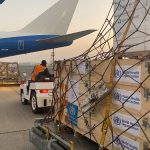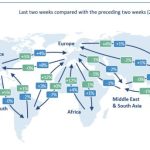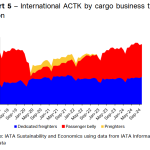LUFTHANSA CARGO Reaches new heights, explores new frontiers
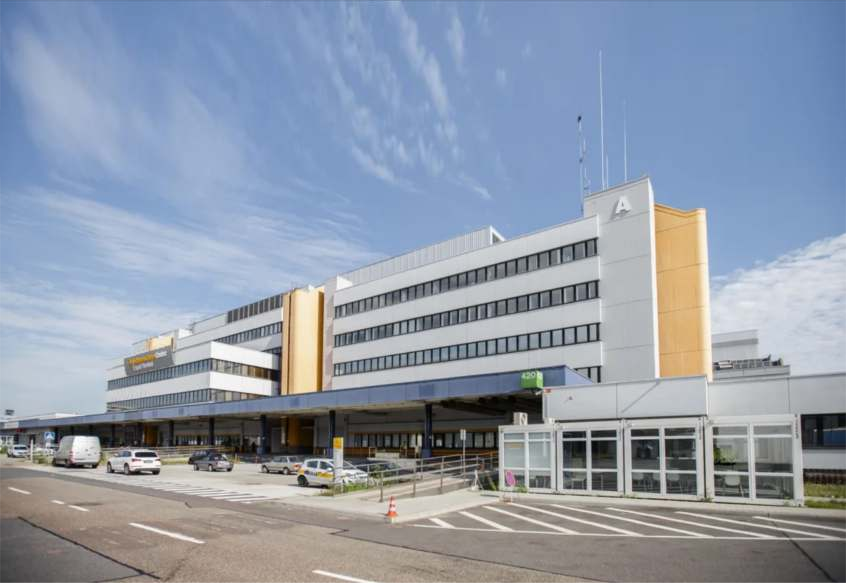 In its more than 26 years in the air cargo industry, Lufthansa Cargo has never been busier than now. Like other airfreight carriers in this time of the pandemic, the airline rose to the challenge of flying vital medical supplies and pharmaceuticals across continents as countries race against time to save lives and prevent the further spread of the COVID virus.
In its more than 26 years in the air cargo industry, Lufthansa Cargo has never been busier than now. Like other airfreight carriers in this time of the pandemic, the airline rose to the challenge of flying vital medical supplies and pharmaceuticals across continents as countries race against time to save lives and prevent the further spread of the COVID virus.
In Financial Year 2020, Lufthansa Cargo revenues rose by 11 percent to EUR2.76 billion, its best result so far since its establishment in 1994. The company’s adjusted EBIT amounted to EUR772 million (previous year: EUR1 million), corresponding to a margin of 28 percent.
This, even as the belly capacity of its allied airlines were lost for many months due to the global travel ban and the lockdown. In 2020, Lufthansa Cargo said it sold 6.5 billion freight ton kilometers (-27 percent). Average load factor improved by 7.8 percentage points to 69.1 percent, while cargo capacity shrank by 36 percent.
Working closely with passenger airlines within the Lufthansa Group—Lufthansa, Austrian Airlines, Brussels Airlines and Eurowings—Lufthansa Group also made hundreds of flights using passenger planes converted as freighters temporarily to transport goods.
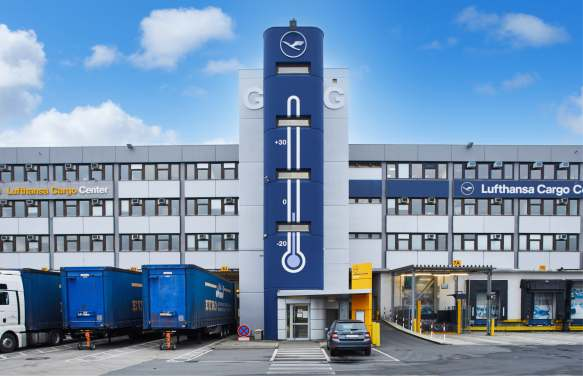 Dorothea von Boxberg, Chairperson of the Executive Board and Chief Executive Officer of Lufthansa Cargo, who officially assumed her new role on March 1, said, “We are pleased to close what was probably the most challenging year in our company’s history with a record result. It is also a record in terms of the commitment and flexibility of our workforce—and we are proud of the outstanding cooperation with our long-standing partners and customers.”
Dorothea von Boxberg, Chairperson of the Executive Board and Chief Executive Officer of Lufthansa Cargo, who officially assumed her new role on March 1, said, “We are pleased to close what was probably the most challenging year in our company’s history with a record result. It is also a record in terms of the commitment and flexibility of our workforce—and we are proud of the outstanding cooperation with our long-standing partners and customers.”
At the company’s annual press event held virtually for the first time on March 5 due to the extraordinary circumstances we now live in, von Boxberg underscored the airline’s plan to move forward with digitalization along its entire transport chain.
“This success enables very decisive investments in our future. We want to make airfreight sustainably better and further strengthen our home base in Frankfurt. That is why we will gradually modernize our cargo center in the coming years and continue to drive forward digitalization along the entire transport chain,” she said.
The company is optimistic sustaining growth made in 2020 with demand for air cargo still high. Volumes from China remain strong and consumer confidence in Europe is still stable.
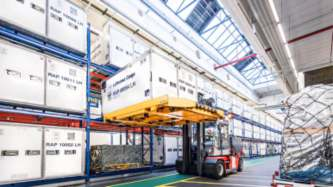 “Airfreight is a very volatile business,” said von Boxberg. “But for this year, we can say that we will have a good year in airfreight again although it will probably not quite stay at the record levels we have seen in the past months. People will import more.”
“Airfreight is a very volatile business,” said von Boxberg. “But for this year, we can say that we will have a good year in airfreight again although it will probably not quite stay at the record levels we have seen in the past months. People will import more.”
Upgrading Frankfurt’s cargo center
At the heart of Lufthansa Cargo’s airport-to-airport airfreight business, which serves around 300 destinations in more than 100 countries with its own fleet of freighters and the belly capacities of passenger aircraft operated by Lufthansa German Airlines, Austrian Airlines, Brussels Airlines, Eurowings and SunExpress, is Frankfurt Airport.
The airport is home to Lufthansa Cargo Center which begun undergoing modernization in January 2021 following the approval of the Supervisory Board of the German airfreight company to invest on the infrastructure.
The center’s comprehensive infrastructure modernization project is expected to be completed by 2028. It involves not just new buildings, but upgrades to existing building sections and warehouses, as well as improvements on logistics systems and internal material flows, thus, making Lufthansa Cargo’s operations even faster and more efficient.
 Lufthansa’s Cargo Center in Frankfurt handles about 80 percent of its global freight volume. The increasing shipments for e-Commerce, new product requirements and the airline’s commitment to digitalization prompted the center’s upgrading, officials said.
Lufthansa’s Cargo Center in Frankfurt handles about 80 percent of its global freight volume. The increasing shipments for e-Commerce, new product requirements and the airline’s commitment to digitalization prompted the center’s upgrading, officials said.
Fleet modernization
Continuing with its fleet modernization program, von Boxberg also disclosed Lufthansa Cargo is adding another Boeing-777F to its freighter fleet.
The twin-engine B-777F plane is the most efficient freighter in its class. It’s scheduled to arrive by fall 2021 in Frankfurt where it will also be stationed.
“This year, we will add another highly efficient Boeing 777F aircraft to our freighter fleet. In doing so, we will also secure jobs in the cockpit and in other areas,” von Boxberg announced.
The new plane is a welcome addition to Lufthansa Cargo’s freighter fleet with increasing demand for air cargo. It will also complement bellyhold capacities of Lufthansa Airlines, Austrian Airlines, Brussels Airlines, Eurowings and SunExpress, to meet customers’ demand.
“Now that we are optimally positioned with one of the world’s most modern freighter fleets, we will work with our customers to drive forward the regular use of sustainable fuels,” von Boxberg said. In November 2020, Lufthansa Cargo had already become the world’s first cargo airline to operate a rotation fully compensated with Sustainable Aviation Fuel (SAF).
Fleet modernization is not confined to Lufthansa Cargo with Lufthansa Airlines considering to ditch older aircraft. The CEO of Deutsche Lufthansa AG or Lufthansa Group, Carsten Spohr, described 2020 as “the most challenging in the company’s history” and “2021 will be a year of redimensioning and modernization for us.”
“The unique crisis is accelerating the transformation process in our company. 2021 will be a year of redimensioning and modernization for us. The focus will remain on sustainability: We are examining whether all aircraft older than 25 years will remain on the ground permanently,” Sporh said in a statement.
“From the summer onwards, we expect demand to pick up again as soon as restrictive travel limits are reduced by a further roll-out of tests and vaccines. We are prepared to offer up to 70 percent of our pre-crisis capacity again in the short term as demand increases. With a smaller, more agile and more sustainable Lufthansa Group, we want to maintain our leading position worldwide and secure the jobs of around 100,000 employees in the long term,” he added.
In an extremely challenging environment for the entire aviation industry, the Lufthansa Group’s logistics subsidiary succeeded in maintaining its global connections with cargo aircraft at all times. The cargo airline countered the pandemic-related, continuous changes in entry regulations for crews, for example, with extremely flexible network planning, officials said.
Rolling out vaccines worldwide
While the global distribution of medical supplies remains a high priority, airfreight carriers are also tapped to distribute COVID-19 vaccines around the world.
The International Air Transport Association (IATA) described the COVID vaccine distribution as the “mission of the century” saying just a single dose needed to provide for 7.8 billion people across the planet would fill 8,000 B-747 cargo aircraft.
The international trade body said careful planning, well-established global time and temperature-sensitive distribution systems are needed not just on air but on land as well to safely deliver the vaccines.
Lufthansa Cargo said it has created a new product specifically for COVID-19 vaccine transports. The product called COVID-19 Temp Premium was opened for booking since 11 January 2021. It provides a high level of comprehensive and personalized customer service along the travel chain, including seamless monitoring of vaccine shipments throughout the entire process and a 24/7 after sales support.
Drawing on its many years of experience in handling medical goods and pharmaceuticals in addition to having some of the best cold storage facilities at varying temperatures, Lufthansa Cargo is also capable of handling larger volumes of vaccines fast and safely.
The company added it has already invested heavily in its temperature control facilities, including the brand new Lufthansa Cargo Pharma Hub Munich as well as the recently extended and upgraded Lufthansa Cargo Pharma Center Chicago at O’Hare International Airport.
Furthermore, with its pharmaceutical hubs and up to 200 other stations with Active Temp Control or Passive Temp Support services worldwide, Lufthansa Cargo has one of the world’s largest airline pharmaceutical networks. 30 of these stations are already CEIV Pharma-certified.
At least seven different types of COVID vaccines have been approved for roll-out as of February 2021. Various data showed nearly 400 million doses have been distributed across 122 countries. The World Health Organization said more than 200 additional vaccine candidates are in development, of which more than 60 are now in clinical development.
But despite billions invested in producing COVID-19 vaccines by different governments and philanthropists, there remains a massive shortage due to scarce resources in producing them. In the US, for instance, both Moderna and Pfizer’s vaccines which contain billions of lipids, are experiencing shortage of lipid supplies because only a handful of factories produce them.
There has also been reports of shortage of glass vials to store the vaccines, syringes among other medical supplies. And the air cargo industry must deliver them as well fast and safely.
Dorothea von Boxberg: Lufthansa Cargo’s new CEO & Chairperson of the Executive Board
Dorothea von Boxberg has been the Chairperson of the Executive Board and CEO of Lufthansa Cargo AG since 1 March 2021. Her responsibilities include Business Development and Cooperation, Legal Affairs, Communications and Corporate Responsibility, Information Management and Digital Transformation, as well as Finance and Controlling.
Born in 1974, von Boxberg studied Industrial Engineering at TU Berlin and as part of a double degree program at ESCP Paris.
She began her professional career in 1999 at the strategic management consultancy Boston Consulting Group. She worked in various industries and several countries.
In 2005, she left to join the Star Alliance management company, where she was responsible for strategy.
In August 2018, von Boxberg was appointed to the Executive Board of Lufthansa Cargo AG as Chief Commercial Officer. Her areas of responsibility included Global Sales, Revenue Management and Pricing, Product Development, Network Planning, and Handling outside the Frankfurt and Munich hubs. The digitalization of commercial processes and the expansion of multi-channel sales were among the most important tasks.









